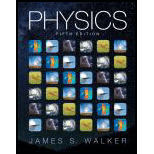
In order to cross the galaxy quickly, a spaceship leaves Earth traveling at 0.9999995c. After 15 minutes a radio message is sent from Earth to the spacecraft. (a) In the Earth–galaxy frame of reference, how far from Earth is the spaceship when the message is sent? (b) How much time elapses on spaceship clocks between when the ship leaves Earth and when the message is sent? (c) How much time elapses on Earth clocks between when the message is sent and when it is received’ (d) If the spaceship replies instantly with another radio message, what total time elapses on Earth clocks between when the message is sent and when the reply is received?
Want to see the full answer?
Check out a sample textbook solution
Chapter 29 Solutions
Physics (5th Edition)
Additional Science Textbook Solutions
Human Physiology: An Integrated Approach (8th Edition)
Chemistry: Structure and Properties (2nd Edition)
Human Biology: Concepts and Current Issues (8th Edition)
Campbell Biology (11th Edition)
Introductory Chemistry (6th Edition)
Chemistry: A Molecular Approach (4th Edition)
- Two powerless rockets are on a collision course. The rockets are moving with speeds of 0.800c and 0.600c and are initially 2.52 × 1012 m apart as measured by Liz, an Earth observer, as shown in Figure P1.34. Both rockets are 50.0 m in length as measured by Liz. (a) What are their respective proper lengths? (b) What is the length of each rocket as measured by an observer in the other rocket? (c) According to Liz, how long before the rockets collide? (d) According to rocket 1, how long before they collide? (e) According to rocket 2, how long before they collide? (f) If both rocket crews are capable of total evacuation within 90 min (their own time), will there be any casualties? Figure P1.34arrow_forwardA spacecraft moves at a speed of 0.900c. If its length is L as measured by an observer on the spacecraft, what is the length measured by a ground observer?arrow_forwardIf two spaceships are heading directly toward each other at 0.800c, at what speed must a canister be shot from the first ship to approach the other at 0.999c as seen by the second ship?arrow_forward
- If the ship moves past the observer at 0.01000c, what length will the observer measure?arrow_forwardTwo planets are on a collision course, heading directly toward each other at 0.250c. A spaceship sent from one planet approaches the second at 0.750c as seen by the second planet. What is the velocity of the ship relative to the first planet?arrow_forwardJoe and Moe are twins. In the laboratory frame at location S1 (2.00 km, 0.200 km, 0.150 km). Joe shoots a picture for aduration of t= 12.0 s. For the same duration as measured inthe laboratory frame, at location S2 (1.00 km, 0.200 km,0.300 km), Moe also shoots a picture. Both Joe and Moe begintaking their pictures at t = 0 in the laboratory frame. Determine the duration of each event as measured by an observer ina frame moving at a speed of 2.00 108 m/s along the x axisin the positive x direction. Assume that at t = t = 0, the origins of the two frames coincide.arrow_forward
- You have been hired as an expert witness in the future by an attorney representing the driver of a spacecraft. The driver is accused of exceeding the galactic speed limit of 0.700c relative to the Earth while being chased by a galactic police spacecraft. The driver claims he is innocent, that his speed was well below that limit. You have been provided with the following data: the police spacecraft was traveling at 0.600c while chasing the driver and a technician on the police spacecraft measured the suspected spacecraft as traveling at 0.300c relative to the police spacecraft. What advice should you give the attorney?arrow_forwardA yet-to-be-built spacecraft starts from Earth moving at constant speed to the yet-to-be-discovered planet Retah, which is 20 lighthours away from Earth. It takes 25 h (according to an Earth observer) for a spacecraft to reach this planet. Assuming that the clocks are synchronized at the beginning of the journey, compare the time elapsed in the spacecraft’s frame for this one-way journey with the time elapsed as measured by an Earth-based clock.arrow_forwardA space probe speeding towards the nearest star moves at 0.250c and sends radio information at a broadcast frequency of 1.00 GHz. What frequency is received on Earth?arrow_forward
- Two spaceships approach each other, each moving with the same speed as measured by an observer on the Earth. If their relative speed is 0.70c, what is the speed of each spaceship?arrow_forwardAn enemy spacecraft moves away from the Earth at a speed of v = 0.800c (Fig. P9.19). A galactic patrol spacecraft pursues at a speed of u = 0.900c relative to the Earth. Observers on the Earth measure the patrol craft to be overtaking the enemy craft at a relative speed of 0.100c. With what speed is the patrol craft overtaking the enemy craft as measured by the patrol crafts crew? Figure. P9.19arrow_forwardCalculate the momentum of a proton moving with a speed of (a) 0.010c, (b) 0.50c, (c) 0.90c. (d) Convert the answers of (a)(c) to MeV/c.arrow_forward
 Modern PhysicsPhysicsISBN:9781111794378Author:Raymond A. Serway, Clement J. Moses, Curt A. MoyerPublisher:Cengage Learning
Modern PhysicsPhysicsISBN:9781111794378Author:Raymond A. Serway, Clement J. Moses, Curt A. MoyerPublisher:Cengage Learning Principles of Physics: A Calculus-Based TextPhysicsISBN:9781133104261Author:Raymond A. Serway, John W. JewettPublisher:Cengage Learning
Principles of Physics: A Calculus-Based TextPhysicsISBN:9781133104261Author:Raymond A. Serway, John W. JewettPublisher:Cengage Learning College PhysicsPhysicsISBN:9781938168000Author:Paul Peter Urone, Roger HinrichsPublisher:OpenStax College
College PhysicsPhysicsISBN:9781938168000Author:Paul Peter Urone, Roger HinrichsPublisher:OpenStax College Physics for Scientists and Engineers, Technology ...PhysicsISBN:9781305116399Author:Raymond A. Serway, John W. JewettPublisher:Cengage Learning
Physics for Scientists and Engineers, Technology ...PhysicsISBN:9781305116399Author:Raymond A. Serway, John W. JewettPublisher:Cengage Learning College PhysicsPhysicsISBN:9781305952300Author:Raymond A. Serway, Chris VuillePublisher:Cengage Learning
College PhysicsPhysicsISBN:9781305952300Author:Raymond A. Serway, Chris VuillePublisher:Cengage Learning College PhysicsPhysicsISBN:9781285737027Author:Raymond A. Serway, Chris VuillePublisher:Cengage Learning
College PhysicsPhysicsISBN:9781285737027Author:Raymond A. Serway, Chris VuillePublisher:Cengage Learning





